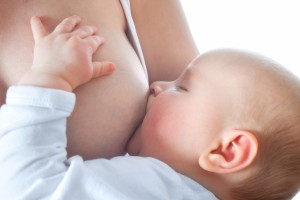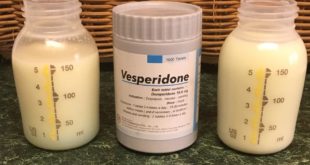 With nearly 79% of women in the United States currently choosing to breastfeed their infants (as opposed to around 20% in the seventies), it is obvious that the majority of women are aware of the many benefits of breastfeeding. When asked why they chose to nurse their baby, most mothers will mention the health advantages, as well as the special closeness they share with their baby. What many are not aware of are the many advantages not just to baby and mother, but to the entire family, as well as to society as a whole.
With nearly 79% of women in the United States currently choosing to breastfeed their infants (as opposed to around 20% in the seventies), it is obvious that the majority of women are aware of the many benefits of breastfeeding. When asked why they chose to nurse their baby, most mothers will mention the health advantages, as well as the special closeness they share with their baby. What many are not aware of are the many advantages not just to baby and mother, but to the entire family, as well as to society as a whole.
Advantages to baby:
- Human milk is biologically specific for human babies. Simply put, this means that each species of mammal makes a milk that is uniquely suited for its young. Out of nearly 5,000 species of mammal, humans are the only ones who feed their young the milk of another species. Cow’s milk is high in protein and minerals because baby calves are up and running within hours after birth – rapid muscle and bone growth is necessary for their survival. In contrast, the human survival organ is the brain. Human milk is high in factors that promote brain growth. This means that children who were breastfed tend to score higher on IQ tests, due to the beneficial effects of human milk on neurodevelopment. As a side note: why not choose a mammal closer to humans to provide an artificial milk supplement for human infants – a primate, perhaps? Can you imagine a gorilla sitting passively, attached to a milking machine like a cow? Not very likely, but kind of fun to think about.
- Human milk contains enzymes, hormones, and immunoglobulins that simply can’t be duplicated in formula, although formula manufacturers keep trying. They advertise that their brand is “most like mother’s milk”, and keep adding stuff like DHA and Probiotics (ignoring the fact that breast milk had those from the beginning), but even they have to (grudgingly) agree that breast milk is best. Look on the can of formula – it says so right on the label, but only because the law makes them do it. It’s in tiny fine print, but if you look closely, it’s there. Since breast milk is always raw and fresh, you don’t lose any of the nutrients that are destroyed in formula processing.
- Breast milk is living tissue that changes to meet your baby’s nutritional needs, and to protect him against disease. The fat content of human milk varies month to month, day to day, and even hour to hour. For example, the milk produced for a premature infant is higher in protein and calories than milk produced for a full-term infant, giving the tiny baby what he needs to catch up on growth. In cold climates, human milk contains more fat – in warm climates, more water. If your baby is very hungry, he nurses more vigorously and receives more fatty hind milk. If he is just thirsty, he feeds more leisurely and receives a lower calorie milk. As he gets older, the fat content of the milk will gradually decrease because his growth will slow, and he will need fewer calories per pound of weight. Standards for formula are based on data about pooled human milk, so every serving of formula is the same. Human milk constantly adjusts during the whole time your baby is nursing.
- Human milk also changes to protect your baby against germs. This is especially important during the first six months of life while his immature system is gradually building his own supply of germ fighting elements, or immunoglobulins. You provide these through your milk for as long as you breastfeed. If you or your baby are exposed to a germ, your milk begins producing antibodies which protect him from the same germs. The white cells in your milk produce a special protein which coats his intestines, preventing the passage of harmful germs from his intestinal tract into his bloodstream. The concentration of antibodies in your milk actually increases as your infant gets older and nurses less often, thus continuing to provide protection as long as you nurse.
- Breast milk contains antiviral, antibacterial, and antifungal factors as well as antibodies to many specific disease organisms. Breastfed babies have a lower incidence of infection, anemia, diarrhea, meningitis, diabetes, gastroenteritis, asthma, constipation, allergies, celiac disease, Crohn’s disease, dental and speech problems, childhood cancer, pulmonary disease, cataracts, high cholesterol, and many more. Artificially fed babies are three to four times as likely as bottle-fed infants to suffer from ear infections and lower respiratory infections, and sixteen times more likely to be sick during the first two months of life.
- Let’s not forget the importance of the emotional security and closeness to mother than nursing infants enjoy. Anyone who has ever seen a baby blissfully drifting off to sleep while nursing, or being comforted at the breast during periods of stress, knows that breastfeeding offers much more than nutritional and immunological advantages. Breastfeeding hormones released while nursing have a calming effect. Breastfeeding ensures that the baby will have lots of physical contact with his mother – there is no way to ‘prop’ a breast! Rather than making babies more dependent, studies have shown that nursing makes babies more independent as they grow up, since their needs have been met so consistently and effectively while they were infants.
- Continuation of your natural reproductive cycle. Breastfeeding suppresses ovulation and delays the return of fertility. In mothers who exclusively breastfeed (no bottles, unrestricted nursing day and night, and no solids before six months), breastfeeding is about 98% -99% effective as a birth control method – about the same as the pill.
- Most women will not have a period while they are exclusively nursing, but will start their cycle again within a few months of introducing solids. World wide, breastfeeding is the most extensively used method of birth control. The majority of nursing women in this country don’t practice this type of exclusive breastfeeding, so most will use another method. One of the nicest things about nursing is that you get to go for a while (usually months) without having a period.
- Breastfeeding helps your body adjust to the many changes that occur after giving birth. As your baby nurses, two hormones are released – oxytocin, which makes your uterus contract and return to its pre-pregnant state more quickly, minimizing blood loss, and prolaction, which helps you relax. Nursing uses up extra calories, and most mothers find that they lose weight faster than formula feeding moms, even without dieting.
- Breastfeeding is easier than bottle-feeding. I once asked a young teenage mom why she chose to breastfeed, and without hesitating, she replied “because I’m lazy!” Breast milk is always ready, always the perfect temperature, and doesn’t need to be measured. There are no bottles to clean and transport, and no formula to keep cooled and then warmed. Night feedings are easier because all you have to do is tuck the baby in bed with you and nurse while you both drift off to sleep. Traveling is easier with a nursing baby – so much less to carry. In emergencies (whether ice storms, tornadoes, or locking your keys in your car and waiting for AAA), breast milk is always immediately available.
- Breastfeeding your infant is emotionally fulfilling. That’s not to imply in any way that mother’s can’t bond with their bottle fed infants, but there is a unique closeness between a mother and her nursing child. Nursing mothers tend to be very in tune with their baby’s needs, and that increases not only the baby’s security, but also the mother’s self confidence in her mothering ability. Being able to comfort a sick, fussy, or tired baby at the breast is one of the most satisfying things about breastfeeding. Nursing your baby means you always have a built in pacifier!
- Breastfeeding provides health benefits for you as well as your baby. Nursing mothers have lower rates of breast cancer, ovarian cancer, cervical cancer, and osteoporosis.
- Baby smells better. No, really, he does. His bowel movements and spit-up have a much less offensive odor than that of a formula fed baby.
- Formula costs average around $100.00 – $200.00 each month, (depending on the baby’s age and weight), and that’s assuming your baby isn’t allergic and can use the less expensive powdered stuff. Hypoallergenic formulas cost a lot more. Add in the cost of doctor’s visits for ear infections, time lost from work to stay home with a sick baby, and you can easily save a couple of thousand dollars during your baby’s first year. Although dads sometimes feel left out of the whole breastfeeding process (especially during the early weeks of exclusive nursing), they really like the fact that they are saving tons of money.
- When siblings see their baby brothers and sisters nursed, it provides a natural form of sex education. What could set a better example in a society so obsessed with breasts as sex objects than seeing your siblings mothered in such a beautiful, natural way?
- With today’s hectic lifestyles, breastfeeding forces you to take a break, sit down, and nurse. It’s almost as if nature provided a feeding system that encourages you to take care of yourself, even if you have a million other things you feel you ought to be doing. Relax and enjoy these precious moments, because babies grow up way too fast.
- Breastfeeding is good for the environment. It involves no use of energy or packaging materials, and no animals, feed, or machinery.
- Breastfeeding is good for employers. Since artificially fed infants are sick more often and for longer periods than breastfed babies, working mothers who don’t breastfeed miss more work. Corporate breastfeeding programs in the US resulted in a 27% decrease in absenteeism and a 36% decrease in health care costs. Working mothers who are supported in the workplace not only miss work less often to care for sick babies, but they tend to be more loyal employees.
- The WIC program in the US spends twice a much per mother for formula as it does for food given to nursing mothers. If each WIC baby nursed for six months, the US government could save $800 million or more in health and welfare costs.
- Artificial feeding costs billions of dollars to governments, health care organizations, and families. In many countries, babies who aren’t breastfed run the risk of increased death rates from illness, diluted formula, and unsafe water.
- Breastfeeding saves lives. Breastfeeding is a matter of life and death for many babies – and not just those in third world countries. Worldwide, 10.6 million children under age five die each year, and 13% of those babies could be saved if they were breastfed. In the US, where formula is more accessible, and better medical care is available, it’s estimated that 900 babys’ lives could be save yearly if mothers nursed for longer periods of time. Research has suggested that early initiation of breastfeeding (within the first hour), and exclusive breastfeeding for the first 6 months of life is can save the lives of more that a million babies a year worldwide, and that infants who are not breastfed in the first month of life may be as much as 25 times more likely to die than infants who are exclusively breastfed. The World Health Organization (WHO) estimates that 1.5 million infants die each year because of inappropriate feeding, given the fact that children vulnerable to disease are being fed with artificial breast milk substitutes rather than naturally breastfed.
I hope this information has given you something to think about if you are trying to decide whether or not to breastfeed your baby. If you have already made your decision, then congratulations. The benefits far outweigh the disadvantages.
Personally, (and I am definitely not objective here because I have the six smartest, most beautiful and talented children on the face of the earth, and the world’s three most perfect grand children – all breastfed, of course), if I had to choose one advantage of breastfeeding, it would be the way you feel the first time your baby pulls off the breast in the middle of nursing and grins at you with milk drooling out the corner of his mouth while milk sprays everywhere, and then eagerly goes back to finish the feeding. That’s a feeling that money just can’t buy.

For more detailed information about the many advantages of breastfeeding, check out this link: http://www.notmilk.com/101.html
Anne Smith, IBCLC
Breastfeeding Basics
(Edited September, 2015)
* Please ‘Pay it Forward’!*
If you found this article helpful, please consider making a small donation to my favorite cause – Project Pets: Spay, Neuter, Love – an all volunteer, non-profit organization that provides free spay and neuter services for homeless rescue dogs and cats…because every baby deserves a home, whether they have two legs or four! Visit Project Pets on Facebook to find out how you can help create a happy ending for a furbaby.
 Breastfeeding Basics
Breastfeeding Basics





